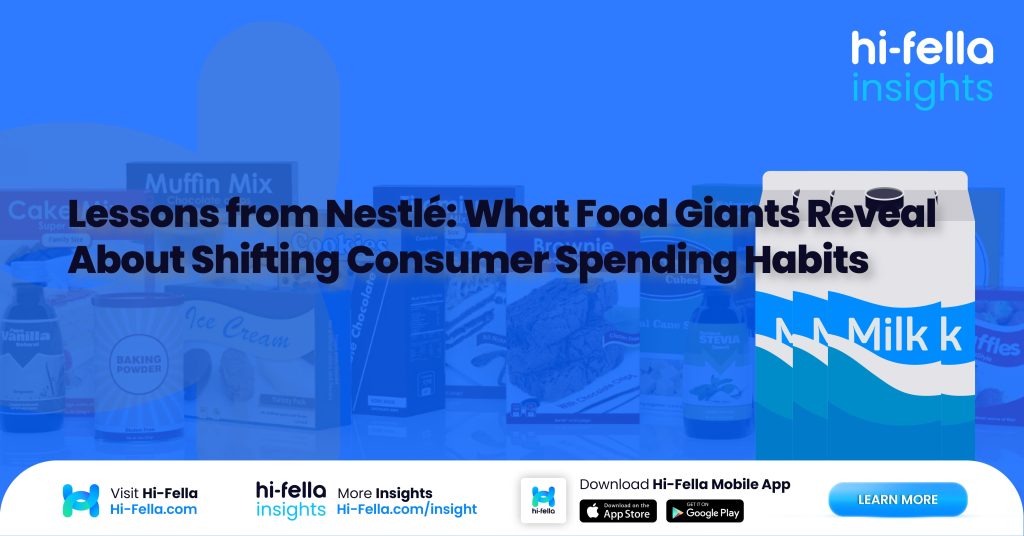In the fast-evolving world of global food trade, consumer preferences are shifting more rapidly than ever before. While food giants like Nestlé have been at the forefront of adapting to these changes, they are revealing valuable lessons for other players in the food industry. As consumers continue to prioritize health, sustainability, and value over volume, food companies are adjusting their offerings to meet new expectations.
In this article, we explore how global food players, particularly Nestlé, are navigating these shifting consumer spending habits and what other businesses can learn from their strategies.
Table of Contents
From Quantity to Quality, Nestlé’s Rise of Premium Essentials
In recent years, consumers have started trading down in terms of volume but have moved up in value. This shift is evident in the way consumers are choosing higher-quality products, even if it means purchasing less. Instead of buying bulk items at a lower price, consumers are opting for items with added value, such as functional benefits, better ingredients, or ethical sourcing. This trend has led to an increased focus on premium essentials, such as health-focused products, plant-based options, and ethically sourced ingredients.
Nestlé’s Strategic Moves
Nestlé, one of the world’s largest food companies, has been quick to capitalize on this shift. The company has made significant investments in health-focused products, premium coffee brands, and other high-quality offerings to align with changing consumer priorities. For example, Nestlé’s acquisition of the plant-based brand Sweet Earth Foods and its push into the premium coffee market with brands like Nescafé Gold and Starbucks at Home showcase the company’s recognition of consumers’ growing preference for quality over quantity.
In addition, Nestlé has increasingly invested in products that promote wellness, such as nutritional supplements, functional foods, and better-for-you snack options. These products often come at a higher price point but cater to consumers who are willing to spend more on products that align with their health-conscious or ethical values.
The Shift in Consumer Priorities
This shift from quantity to quality is not just about the premium price tag; it’s about the value that consumers perceive in the product. For example, products with transparent sourcing practices, clean labels, and functional benefits are becoming highly desirable. Consumers are more aware than ever about the ingredients in their food, as well as the environmental and social impacts of their purchasing decisions. Nestlé’s focus on clean labels and responsibly sourced ingredients demonstrates its ability to meet these demands, making it a leader in the transition to premium, value-driven offerings.
Affordability Innovation and the “Smart Budget” Consumer
While premium products are on the rise, affordability remains a key factor in consumer spending, especially in emerging markets where economic pressures are more prominent. The ongoing inflationary trends across the globe have led consumers to be more discerning about their purchases. Instead of opting for larger quantities or premium products, many are becoming “smart budget” shoppers, looking for affordable options that still meet their needs for quality and nutrition.
Nestlé’s Affordable Nutrition Strategy
In response to these pressures, Nestlé has expanded its portfolio of affordable nutrition, particularly in markets such as Southeast Asia, Latin America, and parts of Africa. By adjusting pack sizes, pricing tiers, and focusing on local sourcing, Nestlé is able to offer consumers affordable yet nutritious options. The company’s commitment to affordable nutrition is reflected in its development of affordable, fortified foods, such as instant noodles, nutrition-focused beverages, and dairy products that cater to both emerging and developed markets.
In countries like India and the Philippines, Nestlé has adapted its offerings by tailoring its products to local tastes and nutritional needs. For instance, by offering smaller portion sizes or more affordable pricing for staple foods, Nestlé ensures that it remains accessible to consumers despite rising costs of living.
Exporters’ Adaptation to New Consumer Realities
For smaller exporters, these changes in consumer behavior present both challenges and opportunities. Emerging-market exporters need to pay closer attention to these trends, adjusting their product offerings to ensure they are in line with local pricing expectations. Additionally, embracing innovation in pricing structures and packaging can help make products more accessible to budget-conscious consumers without compromising on quality.
This trend toward affordability innovation is likely to continue, and exporters who can offer high-quality products at competitive prices will find themselves in a strong position to meet the evolving demands of global markets.
Health-Conscious and Eco-Aware Spending in a Post-COVID World
The global pandemic has had a lasting impact on consumer behavior, particularly in the food industry. In the wake of COVID-19, consumers are increasingly prioritizing their health and well-being, with a focus on nutrition and immunity-boosting foods. At the same time, environmental concerns, such as reducing carbon footprints and supporting sustainable farming practices, have become more prominent in consumers’ purchasing decisions.
Nestlé’s Commitment to Plant-Based and Sustainable Products
Nestlé has been proactive in responding to these changes, particularly through its investment in plant-based products and sustainable practices. For example, the company’s plant-based food line, including products like the Wicked Kitchen brand and the Garden Gourmet range, has grown in popularity as consumers seek healthier, more sustainable alternatives to traditional animal-based products.
In addition to plant-based options, Nestlé has made significant strides in reducing its carbon footprint and advancing its sustainability goals. The company has set ambitious targets to achieve net-zero emissions by 2050 and has been actively working on reducing water usage and waste across its operations. These efforts resonate with eco-conscious consumers, particularly millennials and Gen Z, who are more likely to make purchases based on a brand’s environmental and social impact.
The Rise of “Better-for-You” Products
Health-conscious spending is not just about plant-based diets—it also includes a shift towards clean-label products, functional foods, and items that promote overall well-being. Consumers are now more attuned to ingredients that support immunity, digestive health, and mental well-being. In response, Nestlé has expanded its product lines to include items like nutritional supplements, probiotic drinks, and functional snacks that cater to this demand.
Global consumer data from NielsenIQ and Kantar has shown that health and sustainability are now major factors influencing purchasing decisions. Even in tough economic times, consumers are willing to spend more on products that align with their health and eco-friendly values. This trend presents a significant opportunity for food exporters to expand their offerings to meet the growing demand for healthier, environmentally conscious products.
Digitally Informed, Emotionally Driven Buying Behaviour
As the world becomes more digital, consumer behavior is increasingly influenced by online interactions, social media, and personalized marketing. Consumers are now not only informed by digital platforms but are also emotionally driven in their purchasing decisions, seeking products that align with their values and resonate with their lifestyles.
Nestlé’s Use of Consumer Analytics and AI Insights
Nestlé has leveraged consumer analytics and artificial intelligence (AI) to stay ahead of fast-moving preferences. By analyzing consumer behavior across digital platforms, Nestlé is able to tailor its marketing and product offerings to meet evolving trends. The company uses social listening tools to track consumer sentiments and adjust its strategies accordingly, ensuring that it remains responsive to changing tastes and expectations.
For smaller exporters, this trend highlights the importance of leveraging digital platforms to understand consumer preferences and behaviors. Using data-driven insights and digital showcase platforms can help exporters better target their messaging, create personalized marketing campaigns, and ultimately drive sales.
Join Hi-Fella Today!
As global food giants like Nestlé adapt to shifting consumer behavior, exporters and traders must also evolve to remain relevant. In today’s market, being digitally connected and insight-driven is more important than ever. Hi-Fella offers the tools and resources to help food exporters and traders connect with buyers around the world, stay informed about the latest market trends, and meet evolving consumer demands.
With Hi-Fella’s platform, exporters can leverage smart discovery tools, access real-time market insights, and reach buyers who are actively seeking innovative, high-quality, and affordable food solutions. Join Hi-Fella today to trade smarter, connect faster, and grow globally with confidence.








